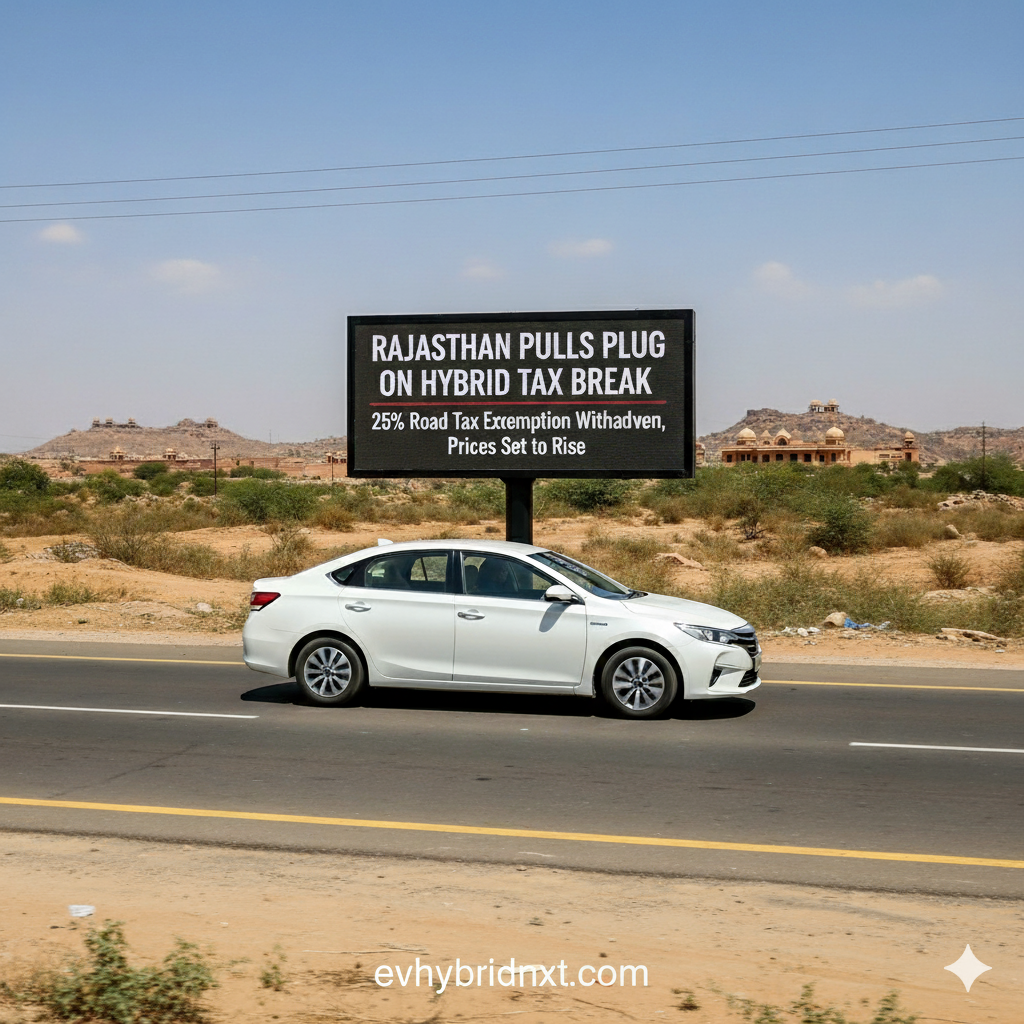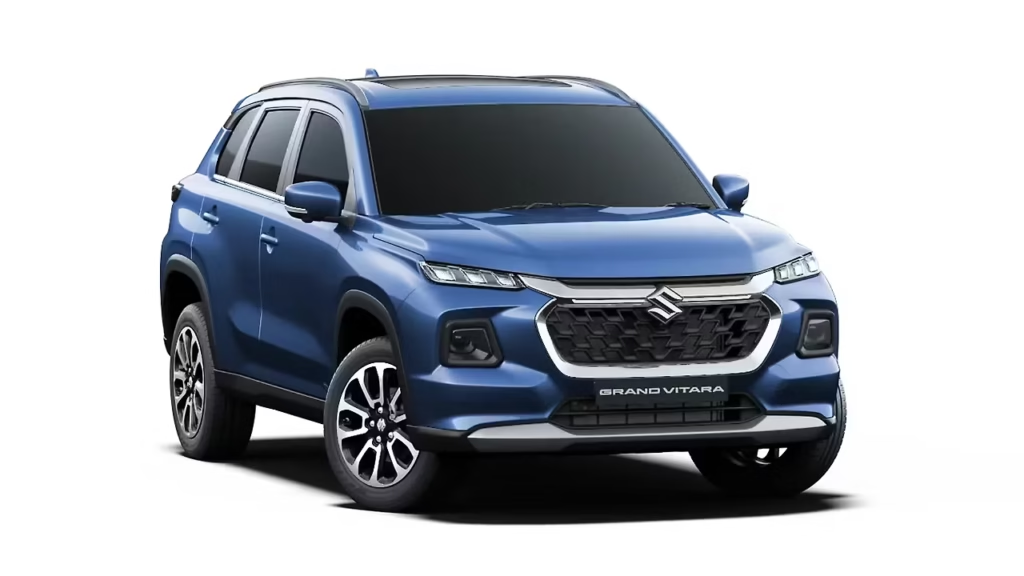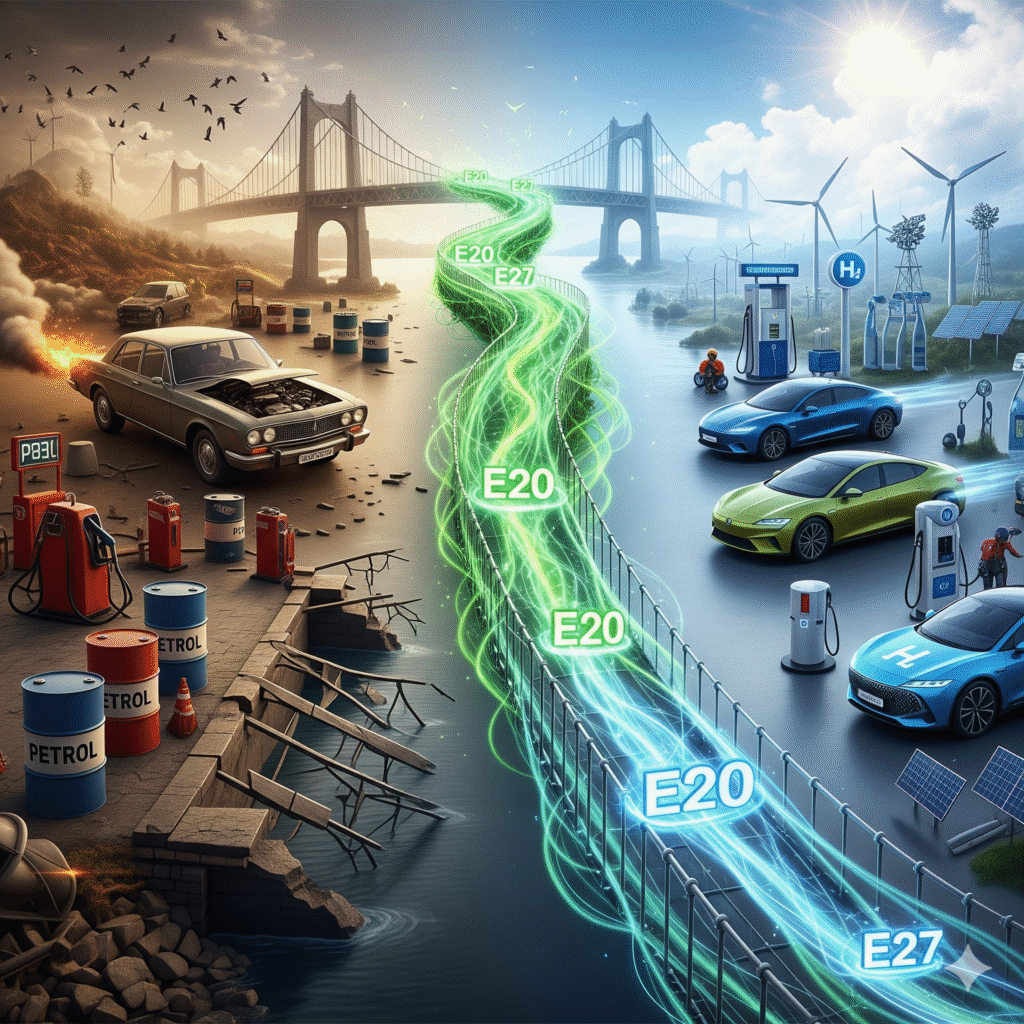The Rajasthan government has quietly rescinded its February 10, 2023, notification granting a 25 per cent exemption on one-time road tax for strong hybrid electric vehicles (HEVs), a move that could dampen sales in a state already lagging in electric mobility adoption.
Business Standard first reported the development, which comes amid national debates on prioritizing pure EVs over hybrids.This reversal arrives roughly two months after NITI Aayog unveiled its India Electric Mobility Index (IEMI) 2024 in August 2025, ranking Rajasthan in the bottom “Aspirant” category with a score of 48 out of 100—highlighting stark deficiencies in charging infrastructure, EV uptake, and policy support.
While the state boasts strengths like high renewable energy capacity (20% of power from renewables) and decent EV penetration in Jaipur (5.3% private, 19.9% commercial), its overall ecosystem scores low, with just 35 in charging readiness and 28 in private adoption
Background: From Incentive to Withdrawal
The 2023 notification was part of Rajasthan’s early efforts to nudge consumers toward greener options, exempting 25 per cent of the one-time road tax—typically 8-12 per cent of the vehicle’s ex-showroom price—for strong HEVs, which combine petrol engines with electric motors for seamless self-charging without plugs. This perk had helped models like the Maruti Suzuki Grand Vitara and Toyota Innova Hycross appeal to eco-conscious buyers in a market where full EVs remain pricey and infrastructure-challenged.
However, the exemption’s extension was previously pushed to December 31, 2023, via amendments, signaling temporary support. The full withdrawal, effective immediately as per the latest order, aligns with a broader national tilt toward battery EVs, as articulated by G20 Sherpa Amitabh Kant, who affirmed the 5 per cent GST on EVs versus 48 per cent on hybrids would persist “for a long period.” Unlike Uttar Pradesh, which waived road taxes on strong hybrids in July 2024—slashing prices by up to ₹4 lakh—Rajasthan’s pivot could reflect fiscal tightening or a sharper focus on zero-emission vehicles
Price Hike Impact: ₹70,000–₹1 Lakh More for Buyers
Industry executives estimate the rollback will inflate on-road prices of strong HEVs by ₹70,000 to ₹1 lakh, depending on the model’s value and base tax slab. For a mid-spec Maruti Grand Vitara strong hybrid (ex-showroom ~₹18.5 lakh), this could mean an additional ~₹80,000, eroding the competitive edge against pure petrol SUVs.
Sales could take a hit in Rajasthan, a key market for hybrids given its urban-rural mix and growing middle-class demand for fuel-efficient rides. Nationally, strong hybrids account for a sliver of the market—under 5 per cent—but states like UP saw a 20-30 per cent uptick post-incentives. Here, the move might redirect buyers toward EVs, which already enjoy full road tax exemptions in Rajasthan, though adoption remains tepid due to high upfront costs and sparse chargers (EV-to-charger ratio of 266:1).
| Model | Manufacturer | Ex-Showroom Price (Strong Hybrid) | Est. Price Hike in Rajasthan |
|---|---|---|---|
| Grand Vitara | Maruti Suzuki | ₹18.5–22 lakh | ₹70k–90k |
| Invicto | Maruti Suzuki | ₹25–29 lakh | ₹90k–1L |
| Innova Hycross | Toyota | ₹19–30 lakh | ₹70k–1L |
| City e:HEV | Honda | ₹19–21 lakh | ₹70k–85k |
Hit to Key Players: Toyota, Maruti, and Honda in the Crosshairs
The decision directly impacts Japanese giants Toyota, Maruti Suzuki, and Honda Cars India, who dominate the strong hybrid segment. Toyota’s Innova Hycross and Camry, Maruti’s Grand Vitara and Invicto, and Honda’s City e:HEV—launched as “India’s first strong hybrid sedan”—rely on tax sops to offset their premium pricing over mild hybrids or ICE variants. These firms have lobbied for hybrid incentives, arguing they bridge the gap to full electrification by cutting emissions faster in infra-poor regions.
Maruti, India’s largest carmaker, could feel the pinch most, with hybrids forming a growing chunk of its “green” portfolio amid slowing overall sales. Toyota, a hybrid pioneer, might pivot to exports or push for national relief, while Honda eyes export markets to cushion domestic blows.
Tied to IEMI 2024: A Wake-Up Call for Rajasthan’s EV Lag
The timing isn’t coincidental. NITI Aayog’s IEMI 2024, tracking 19 states on charging, adoption, and innovation, pegged Rajasthan 8th among Aspirants—behind leaders like Delhi (Achiever, score 100) and Karnataka (Front Runner).Key gaps include low commercial EV adoption (score 13) and innovation (46), despite renewable strengths and partnerships like Tata Power’s ₹1.2 lakh crore clean energy tie-up.
Recommendations urge Rajasthan to notify a dedicated EV policy, boost subsidies for scrapping old vehicles, streamline charger approvals, and foster R&D hubs. Withdrawing hybrid perks might signal a refocus on pure EVs, but experts warn it risks alienating buyers without addressing infra woes—potentially widening the adoption chasm.
Industry Echoes: Pushback Amid National Divide
Hybrid advocates like Maruti and Toyota decry the move as shortsighted, echoing their stance against EV-only policies that ignore hybrids’ 30-40 per cent efficiency gains.Rivals like Tata Motors, favoring full EVs, may quietly applaud, as it levels the playing field in a state where their Nexon.ev already undercuts hybrids post-tax exemptions.No official rationale from Rajasthan’s transport department, but fiscal prudence or alignment with Centre’s EV-first agenda (FAME-III subsidies skewed toward batteries) seems likely.
Outlook: A Detour or Dead End for Hybrids in Rajasthan?
Rajasthan’s U-turn underscores the patchwork of state EV strategies—UP’s embrace versus this retreat—complicating national goals of 30 per cent EV penetration by 2030. For consumers, it means pricier hybrids; for the state, a potential boost to EV sales if paired with IEMI fixes like subsidized chargers.As Rajasthan grapples with its “Aspirant” tag, will this spur bolder reforms or stall green momentum? Carmakers eye reversals, but with budgets tight and EVs in the spotlight, hybrids’ road in the Desert State just got bumpier. Watch for dealer feedback and possible legal challenges as the dust settles.



